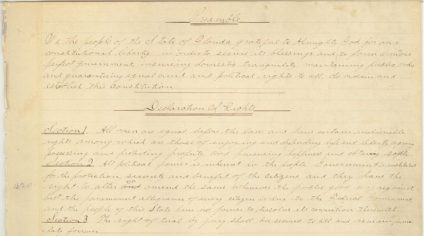2020 Election – Florida Constitutional Amendments
So there are six amendments for the Florida Constitution on this year’s ballot. I’m going to run through those pretty quickly.
Amendment 1 – Citizenship Requirement to Vote in Florida Elections
This is nothing more than an amendment to try to get more low-information and bigoted voters (you know, Trump’s base) to the polls. It will come as no surprise that the effort was lead by a guy who’s also a member of Mar-a-Lago.
You already have to be a U.S. citizen to vote in Florida. That’s the law, and it’s not open to interpretation. Non-citizens can’t vote. Period. The Florida Constitution currently defines who can vote this way: “Every citizen of the United States who is at least 18 years of age and who is a permanent resident of the state, if registered as provided by law.” This is clearly nothing more than a way to try to inflame a certain group of people to get them to the polls.
Vote NO.

Amendment 2 – Raising Florida’s Minimum Wage
This is pretty clear. It would raise Florida’s minimum wage to from the current $8.25/hour to $10/hour on September 30, 2021. Each Sept. 20th after that the minimum wage will increase by $1/hour until 2026 when it reaches $15/hour.
This isn’t the kind of thing that should be in the Constitution, but since there will never be a living wage if we wait on the Florida Chamber of Commerce owned Republican Legislature, I guess this is how it will have to be. If you’re against people having a living wage, feel free to vote no like the Chamber wants you to with their scare ads. If you think a person should be able to eat and live in at least a modest place with wages from a full-time job, then vote YES.
Vote YES
Amendment 3 – All Voters Vote in Primary Elections for State Legislature, Governor, and Cabinet
So this would basically create an “open primary.” We’re only one of 9 states that still has a closed primary.
Here’s how it works. Every candidate that wants to run for an office would be on a single ballot (no more Republican ballots and Democratic ballots). The two top vote getters would appear on the general election ballot.
No surprise that the two major parties are against this, so that’s an indication it is probably good for the voters. I think it would do a lot to improve who runs. First, in many of Florida’s gerrymandered districts, the winner is really decided in the primary election. This would level the playing a field a bit even in the gerrymandered districts. It would also likely mean all the candidates would have to be more centrist and a bit less extreme to make it to the primary. I also think it could help minority and third-party candidates.
Vote YES
Amendment 4 – Voter Approval of Constitutional Amendments
This is yet another amendment brought to you by the Republican party who desperately want to give citizens less control of their government. They continual oppose things that Florida voters subsequently pass using the amendment process, and they hate that, so they just about every election cycle they come up with some scheme to try to make it harder to get a citizen’s initiative on the ballot. This is one of those schemes.
I happen to think that Florida voters don’t need a mulligan to make decisions. Here’s the thing…if somehow something passes that the super majority of voters don’t like, they can always put an amendment on the very next ballot to rescind the previously passed amendment. Remember, amendments require 60% to pass…so I don’t think that many people are making “mistakes” when casting their ballots.
Vote NO
Amendment 5 – Limitations on Homestead Property Tax Assessments: increased portability period to transfer accrued benefit
I’m going to let the Editors at the Tampa Bay Times explain this one:
If your house has a homestead exemption and you move, you currently have two years to carry that tax break along with you. Except you really don’t. To transfer the Save Our Homes exemption, Florida law says a homeowner must have “received a homestead exemption as of Jan. 1 of either of the two immediately preceding years.” So someone could easily miss out by selling a home late in the year and then building a new home that isn’t finished by New Year’s of the year after next — in other words, after only a year and a few days had passed.
Amendment 5, put on the ballot by the Legislature, would correct that by extending the Florida deadline to three years, a simple fix to make the Constitution reflect what voters actually intended, that homeowners could take their exemption with them for at least two full years. The idea came from Pinellas County Property Appraiser Mike Twitty.
Vote YES
Amendment 6 – Ad Valorem Tax Discount for Spouses of Certain Deceased Veterans Who Had Permanent, Combat-Related Disabilities
Currently, some Florida veterans get a discount on their property taxes if they are over 65, have been disabled by combat and were honorably discharged. The amount of their discount is the same percentage as their disability as determined by the U.S. Department of Veterans Affairs. Amendment 6 would allow a surviving spouse to retain that discount even after the veteran’s death if the spouse holds the title to the property and permanently lives there until that spouse remarries. Nothing wrong with helping out the spouses of combat-disabled veterans after the veteran dies. The estimated cost is pretty low.
Vote YES
